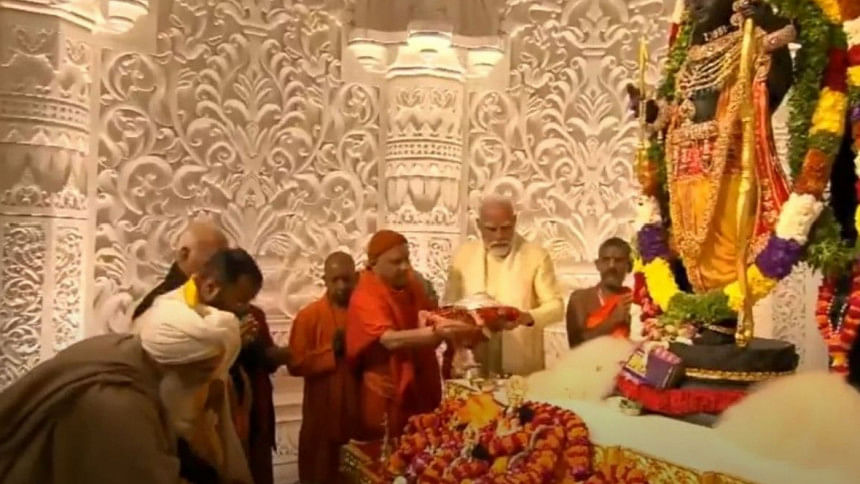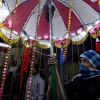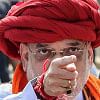Modi opens flashpoint temple symbolising his changing India

Indian Prime Minister Narendra Modi today inaugurated the Ram temple in Ayodhya in the country's most populous state of Uttar Pradesh amid religious fervour, signifying a triumph of his muscular Hindu nationalist politics ahead of the parliamentary elections due in a few months.
The temple is built on grounds where a mosque stood for centuries before it was torn down in 1992 by Hindu zealots incited by members of his party.
All the opposition leaders under the banner of Indian National Developmental Inclusive Alliane (INDIA) stayed away from the Ayodhya event today after having declined an invitation by the Ram temple trust saying it was an out-and-out Modi show with political motives behind it, our New Delhi correspondent reports.
Clad in a golden "kurta" teamed with an off-white "dhoti" and headgear, Modi walked into the sanctum sanctorum of the temple holding a silver umbrella on a folded red dupatta. The prime minister then took the "sankalp" (pledge) for the consecration ceremony for the idol of Lord Ram.
The consecration ceremony is being held after the first phase of the temple's construction, made possible by a landmark ruling by India's Supreme Court in November 2019 on the Ram Janmabhoomi-Babri Masjid title suit dispute.
The Hindu litigants argued the 16th-century Babri Mosque was built at the site of a temple marking the birthplace of Ram.
The mosque was torn down on December 6, 1992, sparking communal violence across India that left 2,000 people dead.
The "Pran Pratishtha" (consecration) of the idol of Ram Lalla, the childhood form of Lord Ram, was attended by people from all walks of life, including representatives of major spiritual and religious sects of the country, leading industrialists and various tribal communities and other prominent personalities.
The Indian government announced half a day's holiday in all its offices in the country so that people can pray and watch the consecration ceremony beamed live by television channels.
Religious fervour gripped Ayodhya, once marred by communal tensions, as biting cold failed to dampen the spirits of those who have flocked here to witness the historic moment.
Today's consecration marked an unprecedented economic boom in this small impoverished town with an under-construction six billion dollar infrastructure facelift that includes an international airport, five-star hotels, shopping malls and wide streets.
Billionaire tycoons Mukesh Ambani and Gautam Adani were among the prominent people invited to the event.
Among other invitees in Ayodhya were BJP's ideological fountainhead RSS chief Mohan Bhagwat, actors Bollywood veteran Amitabh Bachchan, his son Abhishek Bachchan, industrialists Anil Ambani, cricket legend Sachin Tendulkar, actors Hema Malini, Kangana Ranaut, Rajnikant, Pavan Kalyan, Madhur Bhandarkar, Subhash Ghai, Shefali Shah and Sonu Nigam.
Invocations to Ram played in the streets of Ayodhya from early morning, as security personnel kept a tight vigil across the Ayodhya districts.
The Indian prime minister is scheduled to interact with labourers involved in the construction of the temple a member of the Shri Ram Janmbhoomi Teerth Kshetra
Trust, which is in charge of the construction and management of the Ram temple, said.
The Ram Mandir has been constructed in the traditional Nagara style. Its length (east-west) is 380 feet, width 250 feet and height 161 feet. It is supported by 392 pillars and has 44 doors.
The pillars and walls of the temple showcase intricately sculpted depictions of Hindu deities, gods and goddesses.
Temples across India have announced special festivities on the occasion in Ayodhya. From Washington DC to Paris to Sydney, events have also been planned in various parts of the world by either Vishva Hindu Parishad (VHP) or Hindu diaspora groups.
The new 51-inch idol of Ram as a five-year-old boy was sculpted by Mysuru-based Arun Yogiraj and was placed in the sanctum sanctorum located in the ground floor of the temple last Thursday.
Streetlights on flyovers in Ayodhya have been decorated with artwork depicting Ram as well as his cut-outs with bow and arrow and ornamental lampposts.
A multi-layer security cover is in place in Ayodhya for the consecration ceremony, with 10,000 CCTV cameras and drones equipped with Artificial Intelligence keeping an eye on the movement of people. Police personnel in plain clothes have been deployed at the venue.
Movable barriers with barbed wires attached to them can be spotted at every prominent crossroads in the temple town, as police use them to regulate traffic, especially during VVIP movements. Multiple National Disaster Response Force teams trained to tackle chemical, biological, radiological and nuclear attacks, drowning incidents and disasters like earthquakes have also been deployed.

 For all latest news, follow The Daily Star's Google News channel.
For all latest news, follow The Daily Star's Google News channel. 









Comments